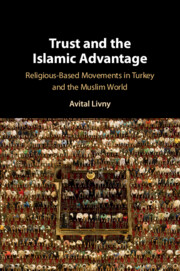Book contents
- Frontmatter
- Dedication
- Contents
- List of Figures
- List of Tables
- Acknowledgments
- 1 Introduction
- Part I Theoretical Development
- Part II Applications and Empirics
- 6 Explaining the Islamic Advantage in Political Participation
- 7 Islam, Trust, and Strategic Voting in Turkey
- 8 The Quasi-Integration of Firms in an Islamic Community: The Case of MÜSİAD
- Part III Theoretical Development
- Appendix
- Bibliography
- Index
6 - Explaining the Islamic Advantage in Political Participation
from Part II - Applications and Empirics
Published online by Cambridge University Press: 31 August 2020
- Frontmatter
- Dedication
- Contents
- List of Figures
- List of Tables
- Acknowledgments
- 1 Introduction
- Part I Theoretical Development
- Part II Applications and Empirics
- 6 Explaining the Islamic Advantage in Political Participation
- 7 Islam, Trust, and Strategic Voting in Turkey
- 8 The Quasi-Integration of Firms in an Islamic Community: The Case of MÜSİAD
- Part III Theoretical Development
- Appendix
- Bibliography
- Index
Summary
The importance of interpersonal trust for participation in mass politics has been established in some contexts, but rarely in the developing world, and the mechanism linking trust to participation has not be well specified. In this chapter, the link between trust and participation is defined in terms of interdependence, on the one hand, and uncertainty, on the other. Based on this, participation levels are expected to be lower for individuals who generally distrust others and higher for those with a salient religious group identity. Moreover, religious group identity is expected to bolster participation because group-based trust operates as an effective substitute for generalized trust, where it is absent. The hypotheses are tested using survey responses from twenty-four Muslim countries, and evidence is found in support of each. Finally, the theory is extended to explain how repression impacts the advantage of Islamic-based political movements: in contrast to existing theories, which hold that repression should effectively sideline Islamic groups, I illustrate how increased repression bolsters the Islamic advantage by making trust even more important for political participation.
- Type
- Chapter
- Information
- Trust and the Islamic AdvantageReligious-Based Movements in Turkey and the Muslim World, pp. 125 - 147Publisher: Cambridge University PressPrint publication year: 2020

